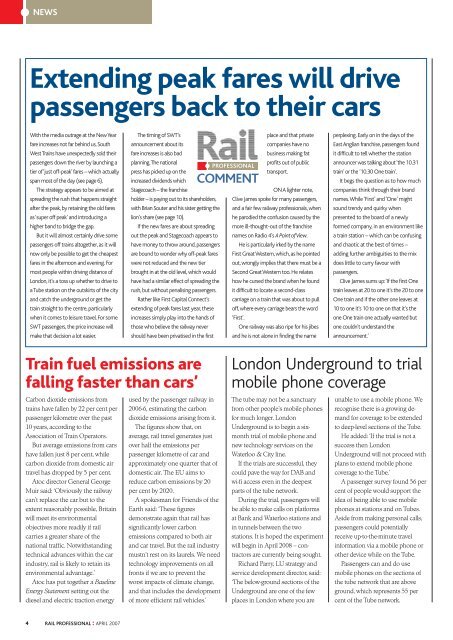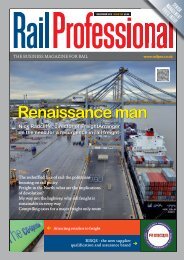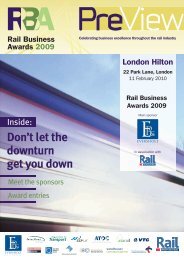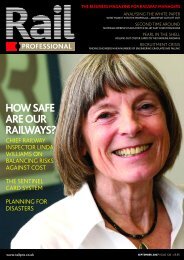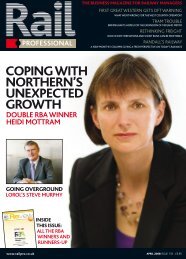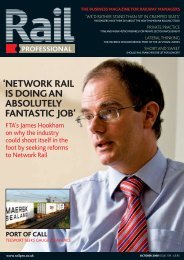'THE GOVERNMENT'S ABSOLUTELY AWARE ... - Rail Professional
'THE GOVERNMENT'S ABSOLUTELY AWARE ... - Rail Professional
'THE GOVERNMENT'S ABSOLUTELY AWARE ... - Rail Professional
You also want an ePaper? Increase the reach of your titles
YUMPU automatically turns print PDFs into web optimized ePapers that Google loves.
NEWS<br />
Extending peak fares will drive<br />
passengers back to their cars<br />
With the media outrage at the New Year<br />
fare increases not far behind us, South<br />
West Trains have unexpectedly sold their<br />
passengers down the river by launching a<br />
tier of ‘just off-peak’fares – which actually<br />
span most of the day (see page 6).<br />
The strategy appears to be aimed at<br />
spreading the rush that happens straight<br />
after the peak, by retaining the old fares<br />
as ‘super off peak’ and introducing a<br />
higher band to bridge the gap.<br />
But it will almost certainly drive some<br />
passengers off trains altogether, as it will<br />
now only be possible to get the cheapest<br />
fares in the afternoon and evening. For<br />
most people within driving distance of<br />
London, it’s a toss up whether to drive to<br />
a Tube station on the outskirts of the city<br />
and catch the underground or get the<br />
train straight to the centre, particularly<br />
when it comes to leisure travel. For some<br />
SWT passengers, the price increase will<br />
make that decision a lot easier.<br />
The timing of SWT’s<br />
announcement about its<br />
fare increases is also bad<br />
planning.The national<br />
PROFESSIONAL<br />
place and that private<br />
companies have no<br />
business making fat<br />
profits out of public<br />
press has picked up on the<br />
transport.<br />
increased dividends which COMMENT<br />
Stagecoach – the franchise<br />
holder – is paying out to its shareholders,<br />
with Brian Souter and his sister getting the<br />
lion’s share (see page 10).<br />
If the new fares are about spreading<br />
out the peak and Stagecoach appears to<br />
have money to throw around, passengers<br />
are bound to wonder why off-peak fares<br />
were not reduced and the new tier<br />
brought in at the old level, which would<br />
have had a similar effect of spreading the<br />
rush, but without penalising passengers.<br />
Rather like First Capital Connect’s<br />
extending of peak fares last year, these<br />
increases simply play into the hands of<br />
those who believe the railway never<br />
should have been privatised in the first<br />
ON A lighter note,<br />
Clive James spoke for many passengers,<br />
and a fair few railway professionals, when<br />
he parodied the confusion caused by the<br />
more ill-thought-out of the franchise<br />
names on Radio 4’s A Point of View.<br />
He is particularly irked by the name<br />
First Great Western, which, as he pointed<br />
out, wrongly implies that there must be a<br />
Second Great Western too. He relates<br />
how he cursed the brand when he found<br />
it difficult to locate a second-class<br />
carriage on a train that was about to pull<br />
off, where every carriage bears the word<br />
‘First’.<br />
One railway was also ripe for his jibes<br />
and he is not alone in finding the name<br />
perplexing. Early on in the days of the<br />
East Anglian franchise, passengers found<br />
it difficult to tell whether the station<br />
announcer was talking about ‘the 10.31<br />
train’ or the ’10.30 One train’.<br />
It begs the question as to how much<br />
companies think through their brand<br />
names.While ‘First’ and ‘One’ might<br />
sound trendy and quirky when<br />
presented to the board of a newly<br />
formed company, in an environment like<br />
a train station – which can be confusing<br />
and chaotic at the best of times –<br />
adding further ambiguities to the mix<br />
does little to curry favour with<br />
passengers.<br />
Clive James sums up:‘If the first One<br />
train leaves at 20 to one it’s the 20 to one<br />
One train and if the other one leaves at<br />
10 to one it's 10 to one on that it's the<br />
one One train one actually wanted but<br />
one couldn't understand the<br />
announcement.’<br />
Train fuel emissions are<br />
falling faster than cars’<br />
Carbon dioxide emissions from<br />
trains have fallen by 22 per cent per<br />
passenger kilometre over the past<br />
10 years, according to the<br />
Association of Train Operators.<br />
But average emissions from cars<br />
have fallen just 8 per cent, while<br />
carbon dioxide from domestic air<br />
travel has dropped by 5 per cent.<br />
Atoc director General George<br />
Muir said: ‘Obviously the railway<br />
can’t replace the car but to the<br />
extent reasonably possible, Britain<br />
will meet its environmental<br />
objectives more readily if rail<br />
carries a greater share of the<br />
national traffic. Notwithstanding<br />
technical advances within the car<br />
industry, rail is likely to retain its<br />
environmental advantage.’<br />
Atoc has put together a Baseline<br />
Energy Statement setting out the<br />
diesel and electric traction energy<br />
used by the passenger railway in<br />
2006-6, estimating the carbon<br />
dioxide emissions arising from it.<br />
The figures show that, on<br />
average, rail travel generates just<br />
over half the emissions per<br />
passenger kilometre of car and<br />
approximately one quarter that of<br />
domestic air. The EU aims to<br />
reduce carbon emissions by 20<br />
per cent by 2020.<br />
A spokesman for Friends of the<br />
Earth said: ‘These figures<br />
demonstrate again that rail has<br />
significantly lower carbon<br />
emissions compared to both air<br />
and car travel. But the rail industry<br />
mustn’t rest on its laurels. We need<br />
technology improvements on all<br />
fronts if we are to prevent the<br />
worst impacts of climate change,<br />
and that includes the development<br />
of more efficient rail vehicles.’<br />
London Underground to trial<br />
mobile phone coverage<br />
The tube may not be a sanctuary<br />
from other people’s mobile phones<br />
for much longer. London<br />
Underground is to begin a sixmonth<br />
trial of mobile phone and<br />
new technology services on the<br />
Waterloo & City line.<br />
If the trials are successful, they<br />
could pave the way for DAB and<br />
wi-fi access even in the deepest<br />
parts of the tube network.<br />
During the trial, passengers will<br />
be able to make calls on platforms<br />
at Bank and Waterloo stations and<br />
in tunnels between the two<br />
stations. It is hoped the experiment<br />
will begin in April 2008 – contractors<br />
are currently being sought.<br />
Richard Parry, LU strategy and<br />
service development director, said:<br />
‘The below-ground sections of the<br />
Underground are one of the few<br />
places in London where you are<br />
unable to use a mobile phone. We<br />
recognise there is a growing demand<br />
for coverage to be extended<br />
to deep-level sections of the Tube.<br />
He added: ‘If the trial is not a<br />
success then London<br />
Underground will not proceed with<br />
plans to extend mobile phone<br />
coverage to the Tube.’<br />
A passenger survey found 56 per<br />
cent of people would support the<br />
idea of being able to use mobile<br />
phones at stations and on Tubes.<br />
Aside from making personal calls,<br />
passengers could potentially<br />
receive up-to-the-minute travel<br />
information via a mobile phone or<br />
other device while on the Tube.<br />
Passengers can and do use<br />
mobile phones on the sections of<br />
the tube network that are above<br />
ground, which represents 55 per<br />
cent of the Tube network.<br />
4 RAIL PROFESSIONAL : APRIL 2007


